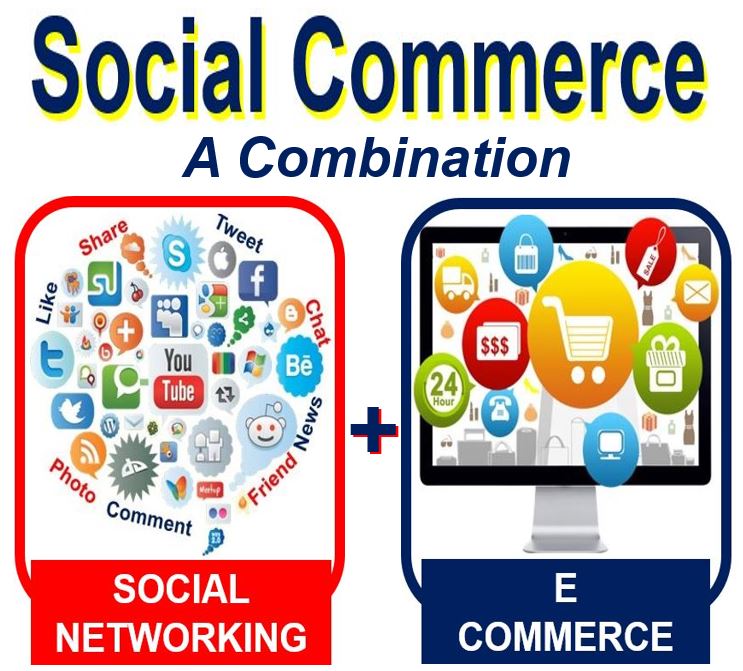Social Commerce is a kind of e-commerce (electronic commerce) that uses online social networks to help in the buying and selling of goods and services. Social commerce uses ratings, online communities, social advertising, F-commerce (Facebook commerce), shares, and stores within the social networking website to buy and sell things.
It is not the same as just ‘commerce’, which is a component of business that focuses on the buying and selling of products and services, usually at macroeconomic scale (large scale).
The term was first used by Yahoo in 2005 to describe a set of collaborative shopping tools such as user ratings, shared pick lists, and other user-generated content-sharing advice and product information.
Social commerce refers to new online marketing strategies or retail models that incorporate peer-to-peer communication – established social networks – to boost sales.

The Financial Times Lexicon says the following regarding social commerce and social shopping:
“Social commerce and social shopping communities merge online shopping and social networking allowing people to actively participate in the marketing and selling of products and services.”
“The distinction between social shopping and social commerce is that while social shopping connects customers, social commerce connects sellers. The term social commerce is often used in practice to describe social shopping as well.”
There are four defining features associated with social commerce marketplaces:
- The sellers are individual people rather than companies.
- The sellers are involved in the creation of product assortments organized as personalized online stores.
- The sellers can place hyperlinks between their custom-made, personalized stores.
- The sellers are paid commissions on the sales made by their personalized stores.
What you get are consumer-driven online marketplaces of personalized shops created by individuals – all connected in a network. Customers can move from shop to shop via hyperlinks.
Social Networking is all about people connecting with people, and perhaps brands are inserting themselves into those conversations. With Social Commerce it is also about people connecting with people, but in this case they are doing so around a natural passion they have for a category or a brand.
Social commerce & social media
Marketing expert Heidi Cohen says that social commerce is where ‘social media meets shopping’.
According to Ms. Cohen:
“Social commerce is the act of consumers with similar interests, passions and needs collectively engaging in conversations related to products and services that satisfy those interests, passions and needs.”
“Those conversations usually segue into several types of actions, such as recommending the products and services to more of their peers, and ultimately the purchase of those products and services.”
Several social commerce websites had been around for a decade when Yahoo first used the term. The peer-to-peer selling platform eBay emerged in 1995. Epilogue, founded in 2000, allows users to discuss, post, and sell their or sci-fi and fantasy art online.
In today’s online marketplace, social commerce represents a wide range of shopping, recommending and selling patterns and behaviors.
Social commerce – 7 categories
Writing in Mashable, Lauren Indvik breaks down social commerce into seven different categories:
– Social Network-Driven: sales that result from referrals from social network websites such as Twitter, Facebook, Pinterest, etc. The ones that occur within Facebook are F-commerce (Facebook commerce) transactions.
– Peer-to-peer sales platforms: where two private individuals buy or sell products or services directly with each other, with no third-party intermediary. The purchaser and seller transact directly with each other. On the Internet, these are community-based marketplaces or bazaars, such as eBay, Amazon Marketplace, or Etsy.
– User-Curated Shopping: refers to social shopping sites where users create and share lists of goods and services for others to shop from. The best example of this type of marketplace are Svpply, Lyst and The Fancy.
– Group Buying: if enough purchasers agree to buy something they are offered at a discount. Examples of this kind of online marketplace include LivingSocial and Groupon.
– Peer Recommendations: these occur in websites that contain product or service reviews by previous purchasers. Users are often rewarded for sharing products and items bought with friends through social networks.
– Participatory Commerce: this sales model allows shoppers to participate in the design, selection or funding of the goods they buy. It revolves around the idea that if buyers are involved as much as possible in the creation of products, they will feel more at home when shopping at a special store or business.
The most common form of participatory commerce (P-commerce) relates to the customization of consumer products, other forms exist where users can decide which products a seller will offer and how their projects are financed.
Retail experts say that P-commerce is the future of consumer shopping and a brilliant way to increase the bottom line. Examples of this kind of marketplace include CutOnYourBias, Kickstarter and Threadless.
– Social Shopping: this is a slang phrase used to describe networked shopping. In e-commerce, it refers to consumers that use social networking services and sites to share the latest items they bought, deals, coupons, want lists, product reviews, and other shopping finds.
Affiliate lists may be used by some users when writing about shopping and products on social spaces such as Twitter or Facebook. Examples include Motilo, GoTryItOn and Fashism.
Video – What is social commerce?
As this Powered Webmaster video explains, social commerce is really the combination of social networking and e-commerce. It is what you get when social networking meets the consumer purchase process.
